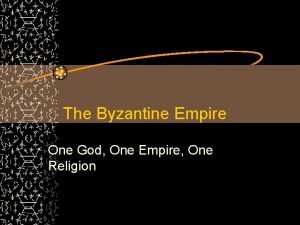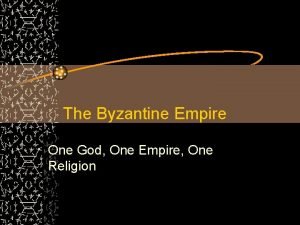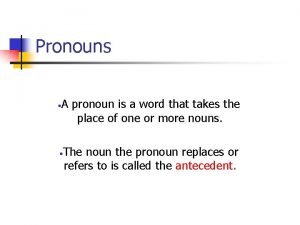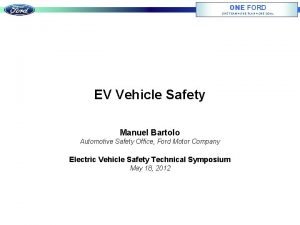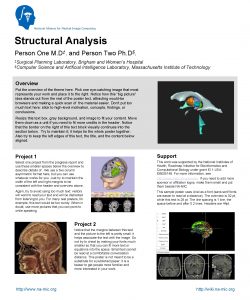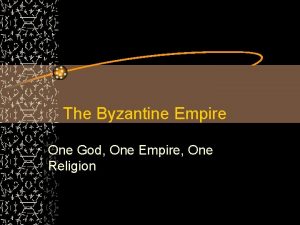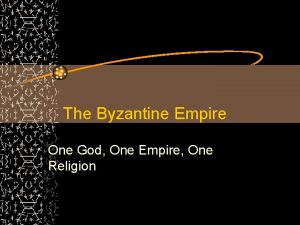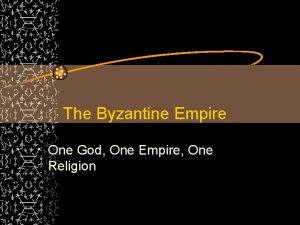God is one Person God is One Person


















- Slides: 18

God is one Person

God is One Person • ". . . Who being the brightness of his glory, and the express image of his person. . . " (Hebrews 1: 3). • Some understand person to mean the body or appearance, the visible expression. • If we accept this definition then clearly the Father is not a person for He is Spirit.

God is One Person • In the Greek this Scripture reads, "the expression of his substance. " • In the Amplified New Testament we read, "He is the perfect imprint and very image of (God's) nature. " • The conclusion is that the word "person" is not actually a proper word to use when referring to Deity, but rather we should use the terms, "substance, nature, being, etc. "

God Has Personality • "And truly our fellowship is with the Father, and with his Son Jesus Christ" (I John 1: 3). • In both the Old Testament and New Testament man is able to have fellowship with God. • Man is able to talk to God and have communion with His Maker.

God Has Personality • This truth must be clearly understood when the personal pronouns are used. • The personal pronoun "He" should always be used, never neuter pronoun "It. " • This is also true when speaking of the Holy Spirit.

God Has Personality • In Acts 2: 2 we find the neuter pronoun "it, " but this is referring to the wind that filled the entire house. • It is correct to refer to the experience of the Baptism of the Holy Ghost as "it" but when we receive the Holy Ghost into our hearts, we receive "Him. " • However, there are not three "He's" in the Godhead.

Man is Body, Soul, and Spirit, But One Person • "And the very God of peace sanctify you wholly; and I pray God your whole spirit and soul and body be preserved blameless unto the coming of our Lord Jesus Christ" (I Thessalonians 5: 23). • "For there are three that bear record in heaven, the Father, the Word, and the Holy Ghost: and these three are one" (I John 5: 7).

Man is Body, Soul, and Spirit, But One Person • "And the very God of peace sanctify you wholly; and I pray God your whole spirit and soul and body be preserved blameless unto the coming of our Lord Jesus Christ" (I Thessalonians 5: 23). • "For there are three that bear record in heaven, the Father, the Word, and the Holy Ghost: and these three are one" (I John 5: 7).

Man is Body, Soul, and Spirit, But One Person • The titles Father, Son and Holy Ghost are freely used in the Scriptures, but this fact does not make three persons or three Gods. • The Bible declares that Father, Son and the Holy Ghost is one person, bearing the one Name, "JESUS. "

God Manifested Himself in the Flesh • "And the Word was made flesh, and dwelt among us" (John 1: 14). • "And without controversy great is the mystery of godliness: God was manifest in the flesh, justified in the Spirit, seen of angels, preached unto the Gentiles, believed on in the world, received up into glory" (I Timothy 3: 16).

God Manifested Himself in the Flesh • In creation, on Mt. Sinai, in the Theophanies, in the Tabernacle, God manifested Himself in a measure to man and man was able to have a certain knowledge of God. • However, in the one Scripture that speaks of God being manifested, we have the greatest knowledge of God ever given for in the incarnation Christ is the express image of the invisible God. (Hebrews 1: 3).

God Manifested Himself in the Flesh • In this regard let us always quote Scripture correctly: • 1. "The Word was made flesh. " (John 1: 14). • 2. "God was manifest in the flesh. " (I Timothy 3: 16).

The Mystery of Godliness • The mystery of godliness is God manifesting Himself in flesh; the mystery of iniquity (II Thessalonians 2: 7) is flesh manifesting itself as God. • These are contrasted in the Scriptures and man has his choice. • If he does not accept the mystery of godliness, he will be compelled to accept the mystery of iniquity.

The Logos is Deity Expressed • "In the beginning was the Word, and the Word was with God, and the Word was God" (John 1: 1). • "Word" is translated from the Greek "LOGOS. " • This Greek word "Logos" means not only the expression of an inward thought but also the thought itself.

The Logos is Deity Expressed • We might say that the meaning of LOGOS is DEITY EXPRESSED. • In other words the "Logos" is the expression of the invisible God. • Just as a man's thinking and expression of that thinking cannot be separated from the man himself and is in essence part of his very being, not another person, so it is with God.

Jesus Christ Possesses a Dual Nature • As a human being He was the Son; as God He was the Father. • As the Son many times He spoke and acted as a man; as the Father many times He spoke and acted as God. • Once this truth is understood the door is open to a clear understanding of just who Jesus really is: THE MIGHTY GOD IN CHRIST: JEHOVAHSAVIOUR.

Jesus Christ is Not the Eternal Son • ". . . The glory as of the only begotten of the Father" (John 1: 4). • "For God so loved the world, that he gave his only begotten Son. . . " (John 3: 16). • ". . . Thou art my Son, this day have I begotten thee" (Acts 13: 33). • The "eternal Son" theory is not Scriptural.

Jesus Christ is Not the Eternal Son • Jesus Christ in the flesh was the begotten Son. (John 3: 16). • The words "begotten" and "eternal" mean the very opposite and contradict each other.
 One empire one god one emperor
One empire one god one emperor One god one empire one emperor
One god one empire one emperor Singular 2
Singular 2 1 2 3 person pronouns
1 2 3 person pronouns Person person = new person()
Person person = new person() Is the word that a pronoun
Is the word that a pronoun One person's garbage is another person's treasure
One person's garbage is another person's treasure God is one person
God is one person God is one person
God is one person Jean watson caring moment
Jean watson caring moment One one one little puppy run
One one one little puppy run One king one law one faith
One king one law one faith Ford one plan
Ford one plan See one do one teach one
See one do one teach one One price policy
One price policy Willow cabin speech
Willow cabin speech See one do one teach one
See one do one teach one Asean tourism strategic plan
Asean tourism strategic plan One vision one identity one community
One vision one identity one community
